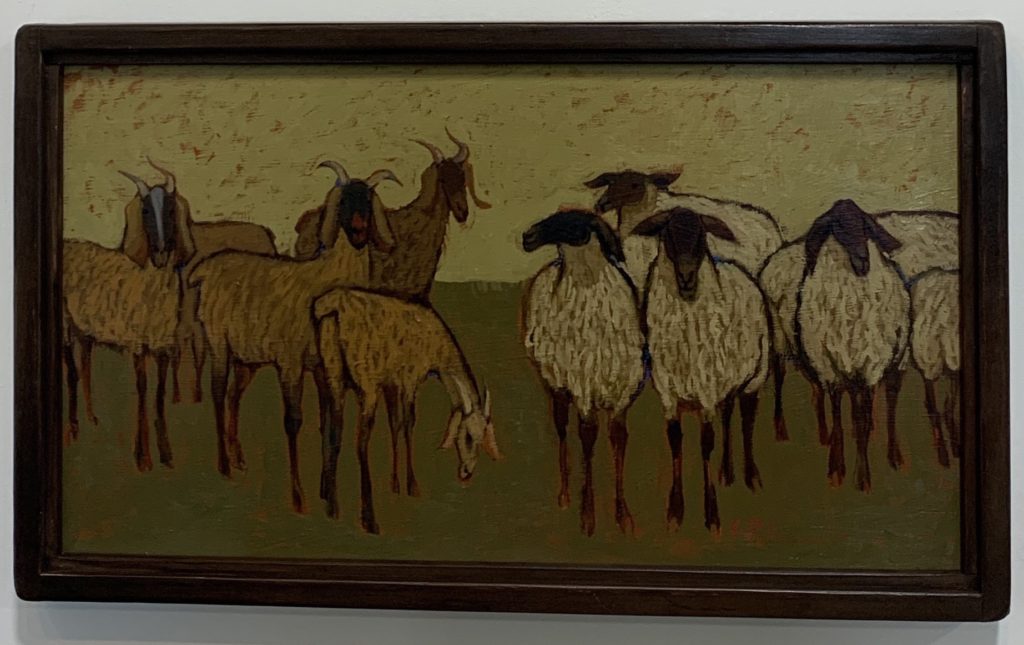Originally published in the Deseret News.

I will be a recipient of a beautiful painting this Christmas painted by Utah artist Kathy Peterson. The painting, titled “Goats and Sheep,” depicts five goats and six sheep in a green pasture. Like all works of art, the painting leaves room for extensive interpretation. It’s precisely the interpretation of the painting that drew me to it.
Students of the New Testament will recall the parable of the sheep and the goats found in Matthew 25. In it, the Savior divides people according to their service to those in need. The sheep are exalted for feeding the hungry, sheltering strangers, clothing the naked and visiting the sick and imprisoned. The goats, in contrast, are chastised for failure to minister to those in need.
A casual reading of this parable yields an important, but casual interpretation: God will judge us according to our service to others. This explanation works just fine, but a deeper and more reflective interpretation provides compelling insights.
In my reflection I ask and seek answers to several questions:
Who is the judge in this parable? It’s certainly not us. We are not asked to separate the sheep from the goats. That’s someone else’s job … someone with much more wisdom, perspective and compassion.
What happens when we try to separate sheep from goats? We fail. As Deseret News columnist Jerry Johnston once wrote in these pages, “I’m never sure who’s who. I’ve seen goats fake it as sheep and seen sheep hidden in the hides of goats. When it comes to who is worthy and who isn’t, I couldn’t tell a sheep from a goat if it bit me on the pituitary.”
What if you like goats? This is me. I like their creative and gutsy spirits as they climb on top of their shelters, eat just about anything and find ways to escape a fenced field. They are at once smart, inventive, full of personality and intensely original.
In biblical times their hair provided fiber for temple linens, milk and cheese offered sustenance, and bellies created vessels for carrying water. Goats were also offered as a religious sacrifice.
I don’t think Christ was putting labels on people in the parable; he is shepherd to us all. Labels get in the way of godliness and limit our love.
What does the parable teach us about true religion versus dogmas and creeds? I don’t use the words “dogmas and creeds” lightly. Principles and beliefs are important, but the sheep and goat parable teaches a powerful lesson: The conditions upon which men and women are rightly judged. It’s not by a set of rules; it’s through Godly kindness, upon which there is no limit.
We are asked to perfect this humanity in our lives. When refined, kindness comes naturally from the heart and shouts out, “How do I love more completely?”
What would Christ do for people who feel marginalized? I’m thinking of racial/ethnic minorities, our wonderful LGBTQ brothers and sisters and daughters and sons, refugees, socio-economically disadvantaged, and so many others who deserve our care, listening ear, understanding and service. Suddenly, dogmas, creeds and cultural norms fade away.
The religious leader James E. Talmage wrote, “Religion without morality, professions of godliness without charity, church-membership without adequate responsibility as to individual conduct in daily life, are but as sounding brass and tinkling cymbals. … Honesty of purpose, integrity of soul, individual purity, freedom of conscience, willingness to do good to all men even enemies, pure benevolence — these are some of the fruits by which the religion of Christ may be known, far exceeding in importance and value the promulgation of dogmas and the enunciation of theories.”
My Christmas painting of the sheep and goats impresses upon me that success in life depends upon well-kept and well-meant human relationships. Human kindness and Godly love without labels is at the center of it all. May we let this spirit thrive during our holiday celebrations this year.
